|
Friends — please mark your calendars for Sunday, 30 June / 7:00 PM ET (6:00 PM CT) on Zoom.
The event is free, but please register here: https://tinyurl.com/murhp48c
0 Comments
Happy National Poetry Month, everyone!
I'll be posting a month of poetry prompts (will do so in weekly batches) — ˆI hope you enjoy writing to them! Please check back often. 30 April Pick 5 words that are concrete images, from one of your favorite poets/favorite books (including words that may be in other languages). Think about how that writer uses these words. Do you use them differently? Similarly? Think of 5 concrete words that float to the top of your mind today and use them to build a poem. 29 April Sometimes the body knows before we do, or before the mind registers it. Intuition? Sixth sense? Luck? Write about the moment before and/or the moment after you experienced that kind of flash of knowledge. What happened? 28 April What did sunlight look like in the kitchen of your childhood? What did rain sound like on the roof of that place? 27 April Who is your favorite villain (in fairy tales, pop culture, literature at large)? Write a poem-letter to this character; what would you say? 26 April Write a poem in which you take something back. 25 April Find a fun or intriguing fact about something in the natural world. Do some more light research on it to find out other facts or contexts in which it appears. Make these paths lead to a poem. 24 April My trainer is always telling me to pin my shoulders back (I typically slouch), in order to free the muscles there for better movement. What is your poem muscle that sometimes slouches? Write about that. 23 April What are the words that stick to your mouth and will not be dislodged? What are the words that go to bed with you? Write a poem about these. 22 April What is your favorite number? Write a poem about it. 21 April In the new translation by Stephanie McCarter of Ovid's Metamorphoses, the opening lines are My spirit moves to tell of shapes transformed into new bodies. Gods, inspire my work (for you've transformed it too) and from creation to my own time spin out unceasing song. These speak of change as a process wrought not only on the forms or shapes transformed, but also on the one/s who are moved to create or effect such change. Write a poem about a change that has had this effect on you. 20 April Write a poem about the question/s that you still carry with you to this day. 19 April Jane Hirshfield wrote about Ono no Komachi, a legendary ninth-century Japanese poet who had lived in the busy capital but who in her old age "came to dwell at the periphery in a number of different ways—[but who carried] within her story a wisdom still essential to the writing life.” Write a poem about that kind of necessity, of inhabiting in-between, marginal, or nearly invisible spaces ; and what it might teach us as poets and as humans. 18 April Write a poem of prophecy. 17 April I first saw the "Infinite Zoom" technique at work in a children's picture book (but heck, I bought it for myself!) called Zoom, by Istvan Banyai https://youtu.be/Kgi-RCEjOLw - it's a delightful and magical exercise in zooming out and out (or in and out), to show how a single detail is related to much bigger universes, in turn. Write a poem that uses it as a technique for development and focus. 16 April Write a poem that is an extended definition of something, by developing it through related/extended metaphors (for example, Jane Hirshfield’s “Today, My Hope is Vertical” www.newyorker.com/magazine/2024/04/08/today-my-hope-is-vertical-jane-hirshfield-poem ) 15 April Write a poem of instruction on how to do something that might seem harder than what it looks, or vice versa - that might seem easier than it looks 14 April Write a poem in which you consider the marvelous in the ordinary. 13 April Write a poem about your favorite underdog or dark horse. 12 April What goes on in the periphery of vision, on the edges of a scene? There are such moments in Breughel's famous painting that W.H. Auden captures in the poem "Musee des Beaux Arts"— while an important thing is happening, "the dogs go on with their doggy life and the torturer's horse/ Scratches its innocent behind on a tree." Write a poem about a significant moment, by focusing on the "peripheral" things surrounding it. How could this perspective allow you to say more about your subject? 11 April A week ago, we pruned the branches of our fig tree. Regular, annual pruning is supposed to help encourage a concentration of growth, leading to more prolific fruiting. Use a pruning analogy or metaphor in a poem—it doesn't have to be about a fig tree, or any kind of tree. Rather, what is it that you want to shear away in order for something to grow better? 10 April In dreams, who comes to visit you? Write this visitation in a poem. 09 April Complex emotions are shaded in a multitude of ways, and they are best expressed not as abstractions but rather, when the writer is able to find a concrete embodiment (in image, metaphor, language) for them. For instance, we know sadness, misery, or envy because we know what their opposite states are, and vice versa. Write a poem that explores these kinds of connection in what we feel, through a specific instance or memory. 08 April Trivia is often a fun poem starter. What kind of poem could (or would) you write, after learning that a platypus sweats milk? or that the circulatory system is more than 60,000 feet long? or that in a lifetime, an average human produces enough saliva to fill two swimming pools? 07 April Today is the birthday of my first-born daughter. Do you know anyone whose birthday it is today? Write a gift poem. 06 April What's something (or things) whose absence makes it feel like everything would fall apart? Write a poem about that. 05 April Have you ever received a note or a letter (it doesn't matter how long ago) that you didn't know how to respond to at the time? or that you simply forgot? Write a poem which both recounts some of the occasion for previous correspondence, and which attempts to make that (re)connection now. 04 April Write a question poem—one in which you pose a question that interests and intrigues you, and that comes out of the attention you pay to some riveting detail you've (just) discovered, or a specific incident in contemporary life. You don't have to provide any answer/s. 03 April Sometimes, a poem is made of lines that read like quiet observations, even if the poem does not lead to any grand conclusion. In a way, this feels reassuring in a world which is full of cross-talk and chaos. I find that such poems allow me to just rest in what they say. What are some things you know at this moment? What are some things you don't know? Write a list poem about either of these (or write two poems). 02 April What is dissonance? It could be the sound or music of language that moves in ways we couldn't have expected in a poem. Or it could be an idea or event that might make its presence felt in that kind of way. Think of a "dissonant" sound, word, idea, or event. Write a poem that explores what it makes us feel more sharply attuned to. For instance—a ship hit a bridge pillar and the bridge collapsed. Imagine that sound, impossible to unhear, cleaving an otherwise ordinary, early morning. What does it make you think of and/or feel? Write a poem about that. 01 April Take a proverb, wise saying, or memorable quotation, and write a poem that makes it concrete and specific. Use any poetic approach, but make the poem a lived, vivid, credible experience in itself. Do not use the words of the proverb or quotation in the actual poem itself, though you could use some or part of it in the title or as an epigraph to the poem after you are done. Happy first day of National Poetry Month on April 01 this year!
As I've done in years past, I will be posting a poetry prompt for each day of April. (But I will do batch-posts by week.) The poet Mahmoud Darwish said, "“Poetry and beauty are always making peace. When you read something beautiful you find coexistence; it breaks walls down.” May our words do such necessary work. Friends,
I'm a contributing editor to the next issue of Consequence — an international literary journal that focuses on the human consequences and realities of war and geopolitical violence, through literature, art, and community events. We are soliciting submissions from BIPOC artists for the next issue. Submissions are open till April 15, and we would love your help forwarding this call for submissions to BIPOC artists, writing teachers, and networks you know. Founded in 2009, Consequence strives to promote a clearer and more nuanced understanding of what’s at stake in choosing to wage war or engage in conflict. The journal publishes six genres— fiction, poetry, nonfiction, reviews, visual art, and translations. This issue's guest editors also include Marcus Jackson, Deborah Taffa, Luisa A. Igloria, Daniel Fernandez, and Adonis Brown. Please help us spread the word to BIPOC artists who may be interested in submitting!  Friends, please join us on Saturday, 10 February, for TWO programs celebrating the East Coast launch of DEAR HUMAN AT THE EDGE OF TIME: POEMS ON CLIMATE CHANGE IN THE U.S. (Paloma Press, 2023) -- MINDFULNESS WALK 12 nn - 1:00 PM Meeting/Starting Point: Mallory Country Club in West Ghent 907 Weyanoke Street Norfolk, VA 23507 Sponsored by the Elizabeth River Trail Foundaton READING & BOOKLAUNCH/SIGNING PROGRAM 5:00 - 7:00 PM Ryan Resilience Lab 4610 Colley Ave, Norfolk, VA 23508 Sponsored by the Elizabeth River Project 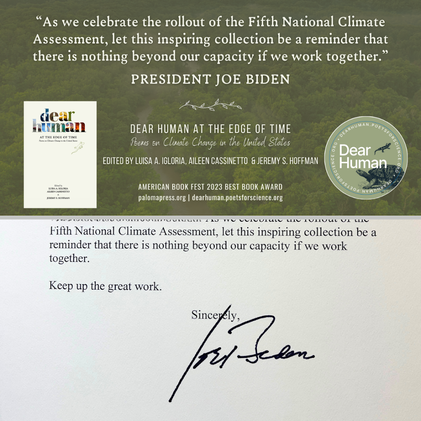 We're so grateful for the ongoing recognition of our anthology Dear Human at the Edge of Time: Poems on Climate Change in the US (Paloma Press, September 2023) . This sends us the message that besides the science which gives us the important information we need as we face the growing challenges of climate extremity, there truly is also a great need for expressing and hearing our stories and poems. We're thrilled therefore at this recognition of our efforts in this book, through this message from President Joe Biden at the White House. Also, here is the link to the interactive DEAR HUMAN microsite (from our collaboration with PoetsForScience and the Wick Poetry Center). We hope that you'll check it out, interact with the poetry prompts there, and share with your own networks. As we move into 2024— if there are poets who are near enough each other and might consider organizing DEAR HUMAN readings in their area, please let us know so we can see how to be of assistance and how we can help to publicize. In the meantime, thank you so much again for your words and hopes for a better world! Today marks 13 years of writing at least a poem a day. When I began this daily writing practice, I had no specific plans for sustaining it over such a length of time. I had no idea. I was simply driven by my own need to carve out some time in the day— every day— where I could meet myself in my writing, by trying to tune out the sounds of other kinds of demands even if only for the space of half an hour to forty minutes at a time. There are many things I've learned about myself and about my own writing process and habits; and there are many more things I know I am still learning. But what my daily writing practice has given me, besides poems to return to and revise and organize into book manuscripts (4) or chapbooks (4), is the joy of knowing I am happiest writing poems. For me this simply means, writing poems is my favorite way to process the information daily life throws at me. And I am very grateful. Here's a prompt I shared in the final session of my recently concluded Poetry Workshop at The Muse Writers Center; I wrote it in the form of a letter -- Dear Poets, On New Year’s Eve afternoon this year, I reluctantly let myself be cajoled into joining our friends/neighbors for an impromptu dinner at their home. I was tired; no, more than tired, dispirited. We’d had a really terrible year, with illness in the family—the back and forth to the doctors, inconclusive results, plenty of trial and error. These kinds of things of course have an impact on our ability to work, to give of our own internal resources; to find rest, ease, laughter… Of course this is hardly original, nor is it new. But when I sat down at my desk to compose this and a prompt for our final week/meeting ahead— I was reminded of that day, looking up/away from this computer, where, by the window, there’s a thriving Monstera plant next to a small potted Pilea. That New Year’s Eve afternoon, after we’d eaten, our friends Sookyung and Harry impulsively said, Let’s go around the corner so you can meet our new friends! They’d met them, she said, because of some random-seeming thing: finding a wallet a few days previous on one of their walks, with their one year old in a stroller… The address was only a few houses away, and they were delighted to be able to do a good deed. When we got there, we were immediately enfolded— by grandparents (who immediately asked to play with S & H’s toddler), nieces, some work friends. People were gathered around board games at the dining table, and a miniature disco ball winked over plates of snacks in the kitchen. We didn’t stay long, because babies had to be put to bed, and it had started to rain. Before we said our goodbyes, though, I complimented our host enthusiastically on the lush and beautiful greenery inside her home, especially all the large and glossy varieties of Monstera in practically every corner. I wish I had a green thumb like yours, I said. She reassured me they were not hard to propagate, then disappeared down the hallway, only to come back with a large glass vase with two Monstera stalks in it, little root filaments waving in the water. She thrust it into my arms—Happy new year! Such a small but generous gesture, but I was overwhelmed. It didn’t magically erase the difficulties and all the feels we were feeling then, but it gave me a tiny green burst of hope. Today, a new leaf has just unfurled from the stalk. Spreading their beautiful hearts open in the window, they remind me to look up and pause. ~ Luisa Writing Prompt Look up from wherever you are and whatever you’re doing. Write about what catches your eye (large or small) — and what you remember. Is there a story that rises to the foreground? Write about the you in that memory either from within the memory, or from the point you inhabit now, in the present. Hello again...
I know I've not been here for a while (it feels like ages) — but so much has happened, and I've been unable to deal with more than just the basic things. For one, my mother passed away in the Philippines at the end of September. She'd been ailing for a while, and in the hospital four months before that, for pesky pneumonia that would not go away, plus a slew of other symptoms and the increasing fragility of someone at an advanced age, like her. When I visited in 2015 (accompanied by my youngest daughter), she was still spunky, spirited, and strong. She walked around town, around Burnham Lake, went to the shops or to church—often wearing a hat to go with her smart outfit, greeting everyone she knew and then taking leave of them with her signature I love you! She brought dragon fruit to us at our hotel, ate many meals with us at Hill Station. Before we left, she came bearing gifts of silver jewelry from the market, and 2 pairs of shoes which she insisted I take— one was a pair of bright pink flats with anemone-like pom-poms, and the other was a pair of gold high-top sneakers with ruffles (!). You can wear them when you go to the grocery store, or even gardening, she exhorted; after all, YOLO. This made me blink in amusement and surprise— I'd never heard her use such expressions. I accepted the flats, but declined the latter pair, saying I was not brave enough to pull those off. I visited again in January 2020, just before (it seemed) the whole world shut down because of the COVID-19 pandemic. I'd been prevailed upon by an older cousin on my father's side, to come home and take care of some of the legal paperwork necessary so that she could continue to help me do everything necessary to assure the care of my mother, even if I no longer lived there. During this visit, my mother's deteriorated physical condition was more than concerning. She was sharing her home with family members, but it appeared that she had been suffering from their cruel and deliberate neglect. That is a longer and more complicated story, but suffice it to say that my cousin and I made arrangements to transfer her immediately to a care home, to a safe environment where she has stayed for the last 3 years before her death— where she was looked after by kind and devoted caregivers. In fact, three of these young women who looked after her, along with my cousin, stayed at her side until the end; and I and my family are forever grateful. We all knew that my mother was approaching the inevitable, and so it feels like we've been incrementally grieving her passing even before she actually transitioned out of her life. While I've tried to be as present as I could be under the circumstances, now that she is gone it has been very difficult to know how to carry this grief. It's only been 2 months since her death. Sometimes I do not know at all what to do with this loss, but I also still feel deeply and in the same way about my father, though he died more than 33 years ago... I try to keep busy, to do what I have to do in my daily life, though everything, including everything in the world these days, feels raw and sharp. FOR IMMEDIATE RELEASE
San Mateo, July 6, 2023 — In the U.S., the congressionally mandated Fifth National Climate Assessment (NCA5) report is currently in development, and groups of scientists from all over the country and Caribbean are overseeing the synthesis of published research for regional and topic-specific chapters. Dear Human at the Edge of Time: Poems on Climate Change in the United States is offered as a companion to NCA5, and an additional opportunity to participate in the urgent conversations on environmental justice. Edited by Academy of American Poets Laureate Fellows Luisa A. Igloria & Aileen Cassinetto and NCA5 Chapter Lead Dr. Jeremy S. Hoffman, the anthology’s 70+ contributors include Union of Concerned Scientists director Erika Spanger and U.S. Poet Laureate Ada Limón, with a Foreword by Claire Wahmanholm & Afterword by Dr. Sam Illingworth. “This book reminds us we are in a state of collapse as well as rebirth. It is both lamp and spear, lyric and shield. It is a companion we will need as we navigate the long dark night of the climate crisis and the rubble of human certainties and conceits.” —Renato Redentor Constantino, Deputy Chair of the Expert Advisory Group of the 58-government Climate Vulnerable Forum So much gratitude to our contributors Ernesto L. Abeytia, Bradley Allf, Anna Bartel, Kristin Berkey-Abbott, Mary Grace Bertulfo, Amanda M. Blake, Dave Bonta, Cassandra Bousquet, Allen Braden, Cynthia T. Buiza, Kate Cell, Eva Chen, Everett Cruz, Natalie Damjanovich-Napoleon, Sofia Fall, Molly Fisk, Mary Fitzpatrick, Eric Forsbergh, Sue Davis Gabbay, Lee Anne Gallaway-Mitchell, Gail Giewont, Caitlin Gildrien, Annette Holland, John Hoppenthaler, Catherine Hulshof De La Peña, E.W.I. Johnson, Melinda Koyanis, Marisa Lin, Karen Llagas, Katharyn Howd Machan, David S. Maduli, Kindra McDonald, Joshua McPeak, Mac Mestayer, Claire Millikin, Rajiv Mohabir, Heidi Mordhost, Susanne Moser, Aimee Nezhukumatathil, January Gill O'Neil, Calvin Olsen, Craig Santos Perez, Jeanine Pfeiffer, Ngoc Pham, Alice Plane, Kyle Potvin, Aman Rahman, Chelsea Rathburn, Sheri Reda, Kim Roberts, Lee Ann Roripaugh, Ellen Sander, Alan Semerdjian, Emily Schulten, Jordan Steven Sher, Kim Shuck, Martha Silano, Brian Sonia-Wallace, Erika Spanger, Mark Spitzer, Eileen Tabios, Ellen Taylor, Sony Ton-Aime, Angela Narciso Torres, Brian Turner, Cindy Veach Lappetito, Claire Wahmanholm, Leana Weissberg, Lesley Wheeler, Wendi White, Denise Wilcox, Maw Shein Win, Diana Woodcock, Khaty Xiong, & U.S. Poet Laureate Ada Limón. For review copies, please email editor "at" palomapress.org Thank you so much to Fish Publishing and to contest Judge Billy Collins, for awarding THIRD PLACE to my poem "Extinction" (out of 2,348 entries).
Here is what the contest judge said about my poem: EXTINCTION by Luisa A. Igloria "A poem with a facility of movement, swinging from the Judas goat to Darwin, a dying dog, and ending with our own dead, how they linger and return. What a pleasure to watch [t]his poet’s mind at work, guiding us this way and that, then landing on our own experience with mortality. A poem with many interests, including the reader." – Billy Collins Congratulations to my fellow winners in the 2023 Fish Poetry Prize! |
"In these bruising days, Archives
June 2024
Categories |

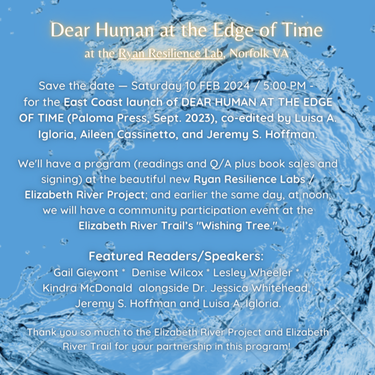
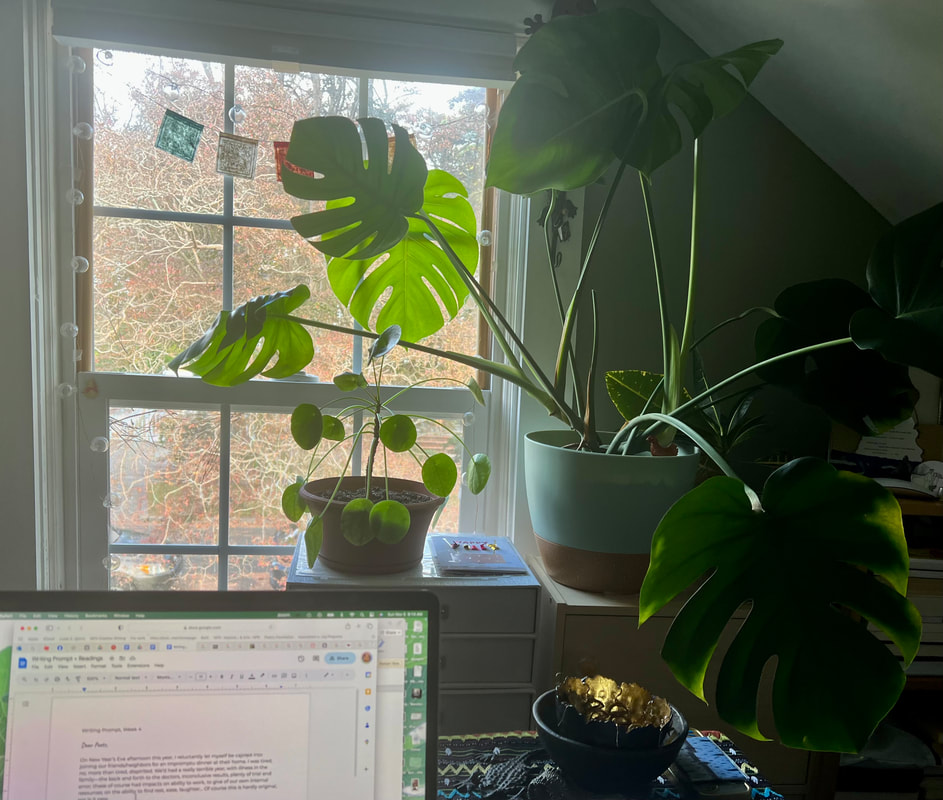
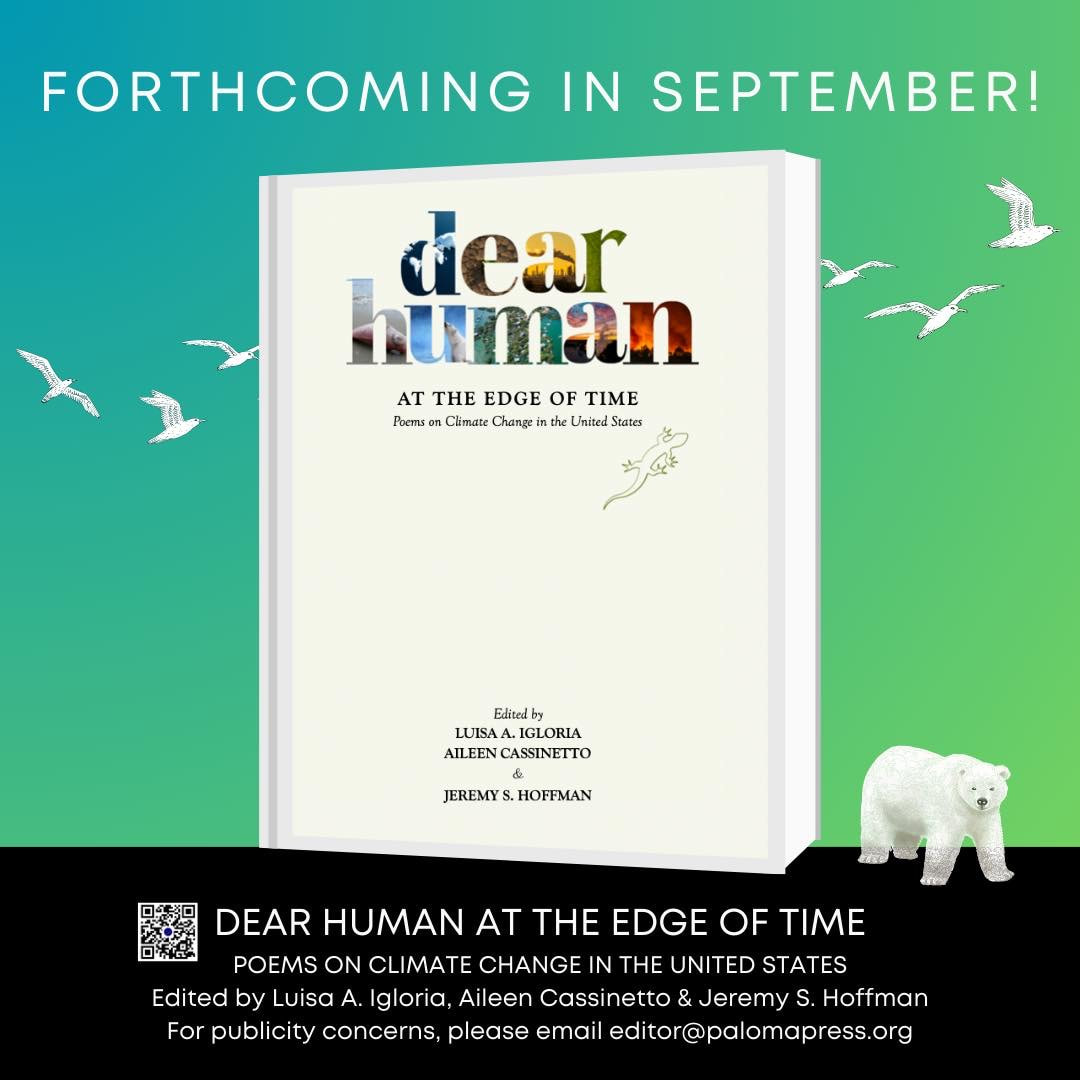
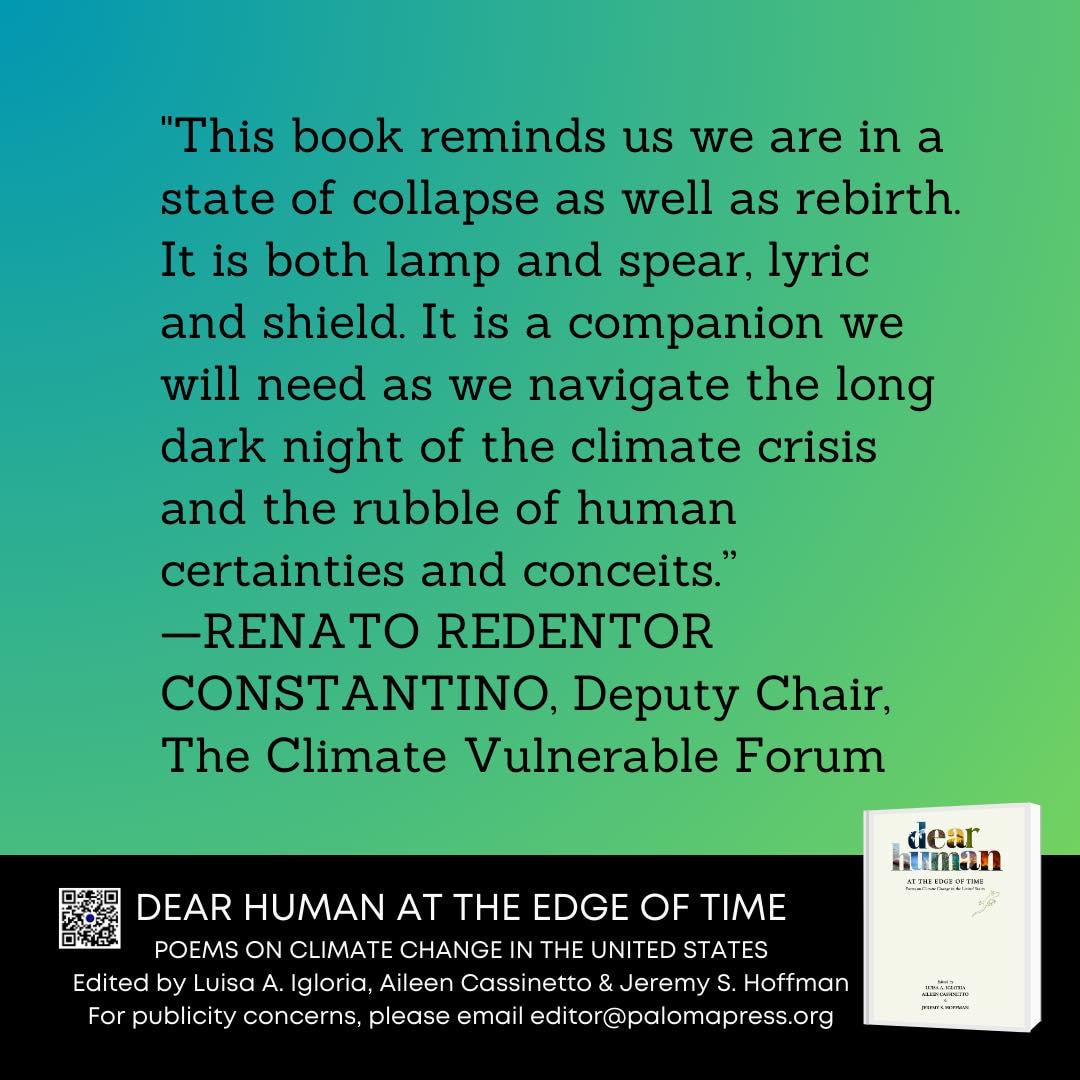
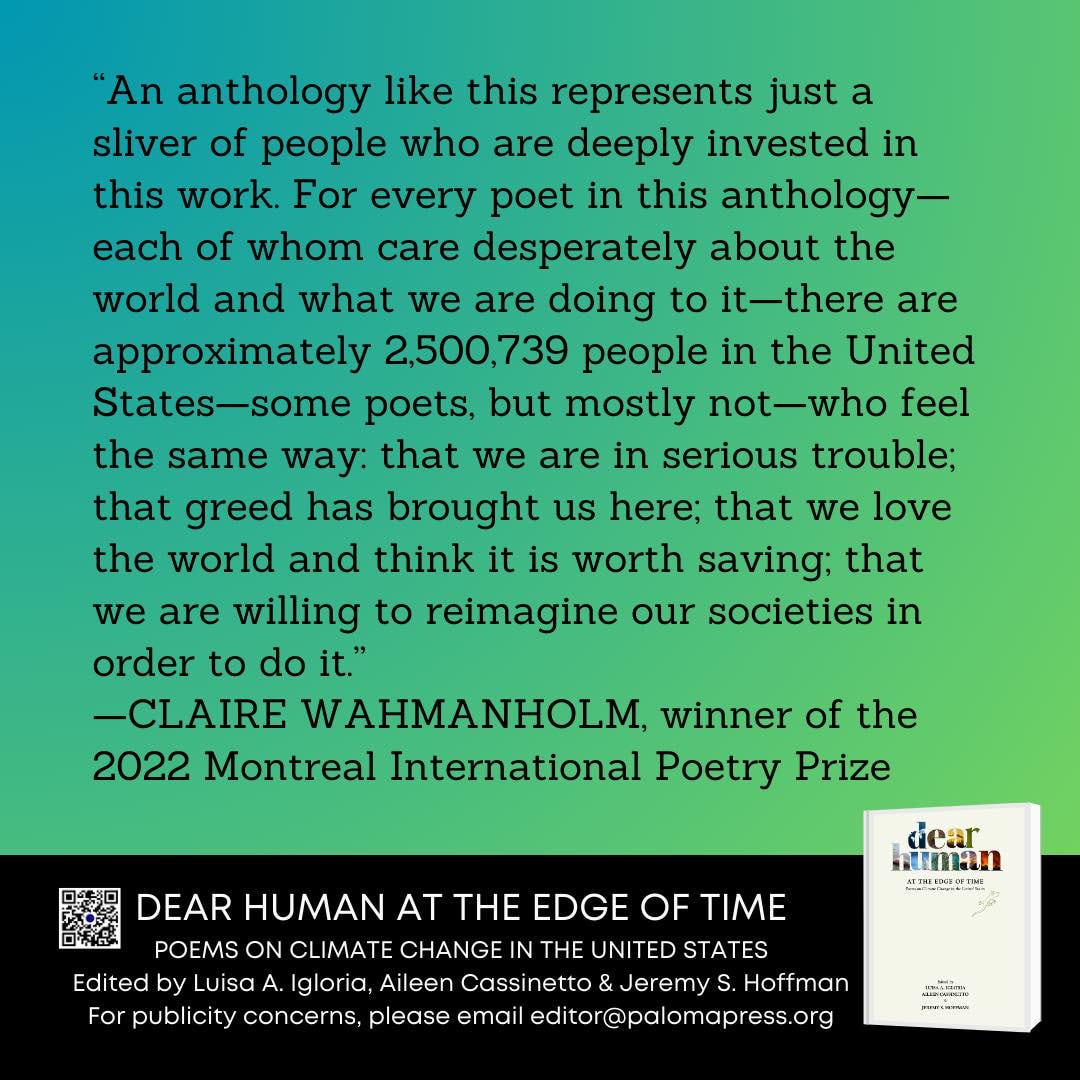
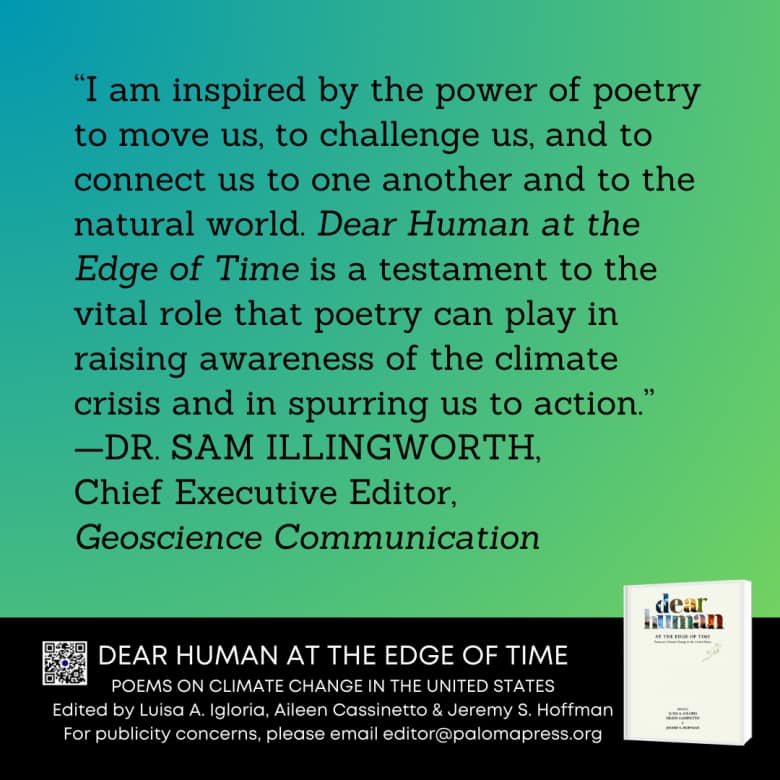
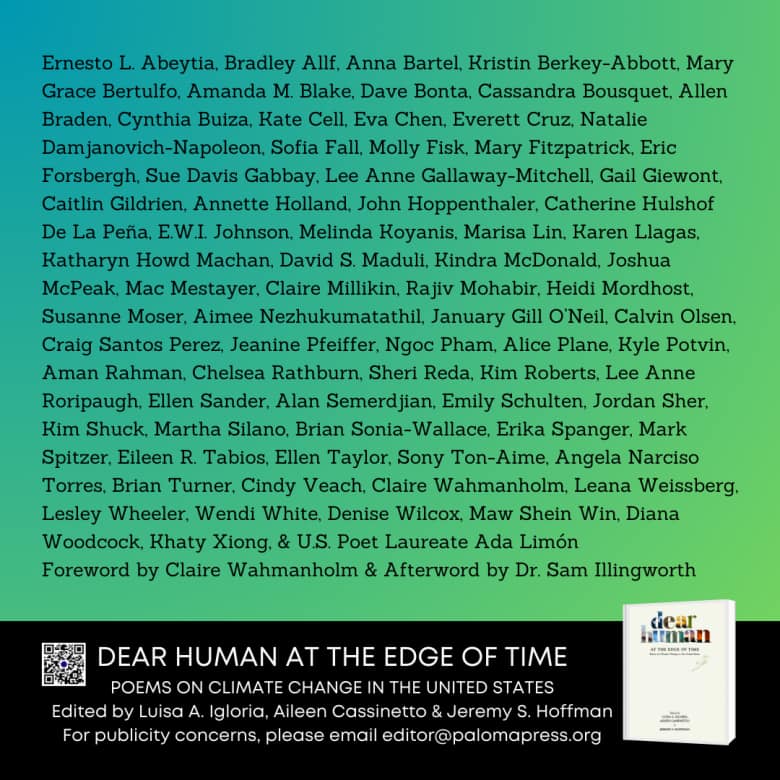
 RSS Feed
RSS Feed